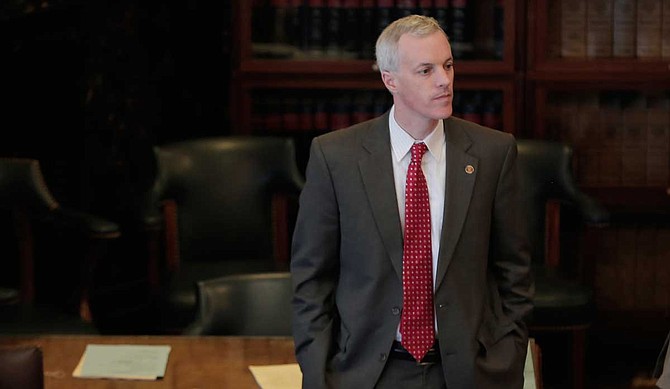Democratic Sen. David Blount of Jackson said keeping donors' names secret "would be the biggest step backward" since Mississippi enacted a campaign finance disclosure law. He said the public should know whose money is influencing politics. Photo by Imani Khayyam.
JACKSON, Miss. (AP) — Mississippi lawmakers are aiming for an early end to their scheduled 90-day session.
This is the fourth and final year of the current term, and most members of the House and Senate are seeking re-election. Finishing early gives all representatives and senators more time with their families and their other jobs (legislating is a part-time gig, after all). And an early wrap-up gives incumbents more time to campaign in their home districts.
The session started Jan. 8 and is scheduled to end by April 7.
During a typical week in a typical session, lawmakers are in Jackson from late Monday afternoon until about the middle of Friday morning, with the heaviest workloads on Tuesdays, Wednesdays and Thursdays. They are usually at the Capitol only one weekend near the end of the session, when negotiators wrangle over the final details of a budget and bond bills for the year that begins July 1.
This session has been more leisurely than most, with the House and Senate taking several long weekends by leaving on Thursdays instead of Fridays.
Most of the big deadlines for general bills have passed, and only a few top issues are unresolved going into these final weeks. Legislators also still need to agree on most budget and bond bills.
The probability of a pay raise for teachers and the possibility of a pay raise for other state employees will be central issues the next couple of weeks.
Senators approved a plan to give teachers an extra $500 a year over two years, for a total of $1,000. The House upped the ante last week, voting for $2,000 a year over two years, for a total of $4,000. The final plan is likely to fall somewhere in between.
Working within the requirement of a balanced budget, legislators will have to decide how much they want to spend on teachers' raises and how much, if any, they want to spend on pay raises for other state government employees. Leaders have not yet offered proposals for state employee raises.
One of the big general bills awaiting final consideration is Senate Bill 2116 , which would ban most abortions once a fetal heartbeat is detected, about six weeks into pregnancy. The House made some changes but kept the main point of the Senate bill intact. Senators could either seek final negotiations or accept what the House did and send the bill on to Republican Gov. Phil Bryant, who pledges to sign it into law.
Several other states, including Kentucky and Georgia, are considering similar fetal heartbeat bills as abortion opponents, energized by a more conservative U.S. Supreme Court, seek a court case to challenge the high court's 1973 decision that legalized abortion nationwide.
Another bill still awaiting consideration by the Mississippi Legislature deals with campaign spending. Senators last week amended House Bill 1205 to say state or local governments could not require disclosure of donors' names to certain types of tax-exempt groups involved in politics.
Republican Sen. Jenifer Branning of Philadelphia said people should be able to donate to 501 (c) (4) social welfare organizations without facing repercussions from those who disagree with their views.
But Democratic Sen. David Blount of Jackson said keeping donors' names secret "would be the biggest step backward" since Mississippi enacted a campaign finance disclosure law. He said the public should know whose money is influencing politics. Blount also said anonymity can lead to demonstrably false claims in campaigns: "When people don't have to put their names on things, they act a fool."
Copyright Associated Press. All rights reserved. This material may not be published, broadcast, rewritten, or redistributed.



Comments
Use the comment form below to begin a discussion about this content.
comments powered by Disqus